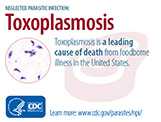Disease
Healthy people (nonpregnant)
Healthy people who become infected with Toxoplasma gondii often do not have symptoms because their immune system usually keeps the parasite from causing illness. When illness occurs, it is usually mild with "flu-like" symptoms (e.g., tender lymph nodes, muscle aches, etc.) that last for weeks to months and then go away. However, the parasite remains in their body in an inactive state. It can become reactivated if the person becomes immunosuppressed.
Mother-to-child (congenital)
Generally if a woman has been infected before becoming pregnant, the unborn child will be protected because the mother has developed immunity. If a woman is pregnant and becomes newly infected with Toxoplasma during or just before pregnancy, she can pass the infection to her unborn baby (congenital transmission). The damage to the unborn child is often more severe the earlier in pregnancy the transmission occurs. Potential results can be
- a miscarriage
- a stillborn child
- a child born with signs of toxoplasmosis (e.g., abnormal enlargement or smallness of the head)
Infants infected before birth often show no symptoms at birth but may develop them later in life with potential vision loss, mental disability, and seizures.
Persons with ocular disease
Eye disease (most frequently retinochoroiditis) from Toxoplasma infection can result from congenital infection or infection after birth by any of the modes of transmission discussed on the epidemiology and risk factors page. Eye lesions from congenital infection are often not identified at birth but occur in 20-80% of infected persons by adulthood. However, in the U.S. <2% of persons infected after birth develop eye lesions. Eye infection leads to an acute inflammatory lesion of the retina, which resolves leaving retinochoroidal scarring. Symptoms of acute disease include
- eye pain
- sensitivity to light (photophobia)
- tearing of the eyes
- blurred vision
The eye disease can reactivate months or years later, each time causing more damage to the retina. If the central structures of the retina are involved there will be a progressive loss of vision that can lead to blindness.
Persons with compromised immune systems
Persons with compromised immune systems may experience severe symptoms if they are infected with Toxoplasma while immune suppressed. For example, a person who is HIV-infected and who has reactivated Toxoplasma infection can have symptoms that include fever, confusion, headache, seizures, nausea, and poor coordination. Persons who acquire HIV infection and were not infected previously with Toxoplasma are more likely to develop a severe primary infection.
Immunocompromised persons who were infected with Toxoplasma at some point before they become immunosuppressed are particularly at risk for developing a relapse of toxoplasmosis.
Toxoplasma infection can reactivate in immunocompromised pregnant women who were infected with Toxoplasma before their pregnancy, and this can lead to congenital infection.
- Page last reviewed: July 10, 2014
- Page last updated: July 10, 2014
- Content source:



 ShareCompartir
ShareCompartir